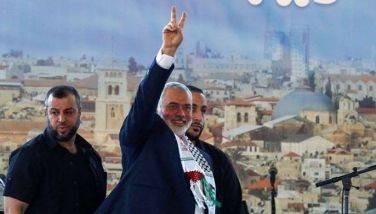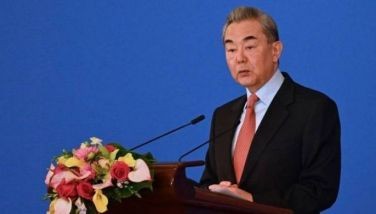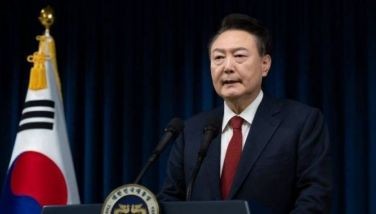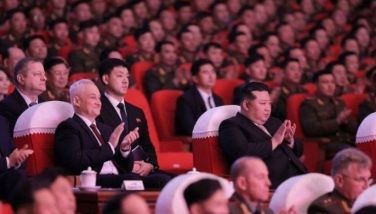Foreign nationals told to leave Lebanon as war fears surge
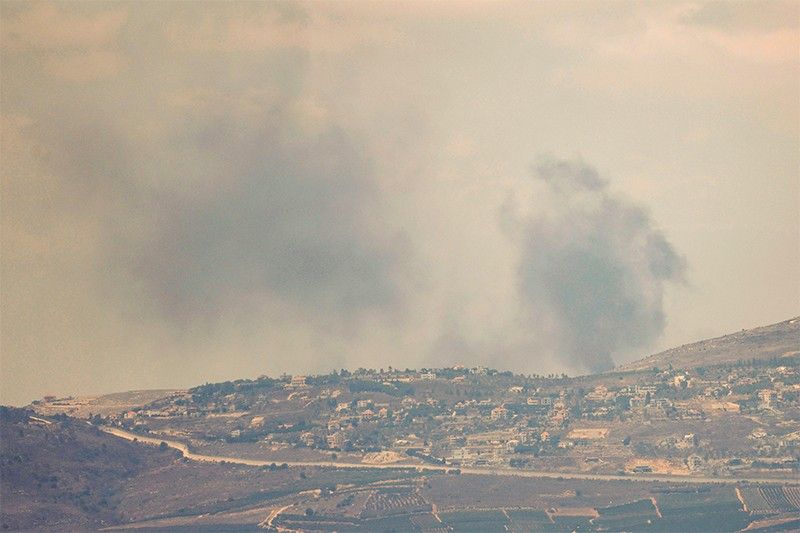
BEIRUT, Lebanon — Urgent calls grew for foreign nationals to leave Lebanon, which would be on the front line of a regional war, as Iran and its allies readied their response to high-profile killings blamed on Israel.
While diplomats worked to avert a feared conflagration, France's Emmanuel Macron and Jordan's King Abdullah II said Sunday a regional military escalation must be avoided "at all costs", the French presidency said after they held a telephone call.
With major military action from Lebanon's Iran-backed Hezbollah movement and others widely expected, Israeli Defence Minister Yoav Gallant said: "If they dare to attack us, they will pay a heavy price."
The nearly 10-month-old war in Gaza between Israel and Hamas has already led to a violent fallout which has become routine around the region.
In the deadliest incident on Sunday in Gaza, the Civil Defence agency said an Israeli strike hit two Gaza City schools housing displaced people, killing at least 30.
This brings to at least 11 the number of schools hit in Gaza since July 6.
Israel's army confirmed the latest strike, saying Hamas was using the schools.
Near the Israeli commercial hub of Tel Aviv, medics and police said two people were killed in a stabbing attack.
The assailant, a Palestinian from the Israeli-occupied West Bank, was "neutralised" by police and taken to hospital, where he was pronounced dead.
'Highly volatile'
Hezbollah, which has traded near-daily fire with Israeli forces since the Gaza war broke out in October, announced the deaths of two of its fighters without specifying where.
The Lebanese health ministry said an Israeli strike on the southern border village of Hula killed two people.
Lebanon's official National News Agency had reported Israeli strikes on various areas of south Lebanon, after Hezbollah said it had fired a fresh barrage of rockets at northern Israel.
The Israeli military said most of the 30 projectiles launched from Lebanon were intercepted.
Sirens sounded again early Monday in northern Israel's Upper Galilee region after "numerous suspicious aerial targets were identified crossing from Lebanon", the Israeli military said.
The attack triggered a fire and an officer and a soldier were "moderately injured", it said on Telegram.
The cross-border violence since October has killed some 547 people in Lebanon, mostly fighters but also including 115 civilians, according to an AFP tally.
Saudi Arabia and France became the latest of several countries calling on their citizens to leave Lebanon.
"In a highly volatile security context", the foreign ministry in Paris "urgently asked" its nationals to avoid travelling to Lebanon and suggested those already in the country leave "as soon as possible".
France also urged its nationals living in Iran to "temporarily leave".
Several Western airlines have suspended flights to Lebanon and other airports in the region.
Qatar Airways said the Doha-Beirut route would "operate exclusively during daylight hours" at least until Monday.
Ceasefire hopes dimmed
Wednesday's assassination of Hamas political leader Ismail Haniyeh in Tehran, hours after the Israeli killing of Hezbollah's military chief Fuad Shukr in Beirut, has triggered vows of vengeance from Iran and the "axis of resistance" of Tehran-backed armed groups.
Israel, accused by Hamas, Iran and others of killing Haniyeh, has not directly commented on the attack.
Israel has vowed to destroy Hamas in retaliation for its unprecedented October 7 attack on Israel which resulted in the deaths of 1,197 people, mostly civilians, according to an AFP tally based on Israeli official figures.
Militants also seized 251 hostages, 111 of whom are still held captive in Gaza, including 39 the military says are dead.
Israel's retaliatory campaign has killed at least 39,583 people in Gaza, according to the territory's health ministry, which does not give details of civilian and militant deaths.
Haniyeh was Hamas's lead negotiator in efforts to end the war. His killing, and that of Shukr, "does not suggest Israel is sincerely interested in a ceasefire", said Middle East expert Andreas Krieg.
Qatari, Egyptian and US mediators have for months tried to broker a truce and hostage-release deal.
'Greatest peril'
Analysts have told AFP that a joint but measured action from Iran and its allies was likely, while Tehran said it expects Hezbollah to hit deeper inside Israel and no longer be confined to military targets.
Israel's ally the United States said it was moving additional warships and fighter jets to the region.
In an interview with ABC News, White House deputy national security adviser Jon Finer said the United States was "doing everything possible to make sure that this situation does not boil over".
As part of those efforts it is "so urgent" that a Gaza ceasefire deal be reached, Finer said.
Secretary of State Antony Blinken emphasised the need to calm regional tensions in a call with Prime Minister Mohamed Shia al-Sudani of Iraq, where some Iran-aligned groups targeted US troops earlier in the Gaza war.
Jordanian Foreign Minister Ayman Safadi held "consultations" with Iran's acting top diplomat Ali Bagheri and met President Masoud Pezeshkian in a rare visit to Tehran, local media reported.
The G7 group of democracies convened by videoconference to discuss the Middle East and expressed "strong concern" over the threat of escalation, Italy's Foreign Minister Antonio Tajani said.
Haniyeh's killing "has brought the Middle East to its moment of greatest peril in years", the International Crisis Group (ICG) think tank said in a report.
The ICG said that securing "a long overdue ceasefire" in Gaza was "the best way of meaningfully reducing tensions in the region".
Hamas officials but also some analysts as well as protesters in Israel have accused Netanyahu of prolonging the war.
"Peace is made with the strong not with the weak," Netanyahu said Sunday at a ceremony in Jerusalem.
- Latest
- Trending














